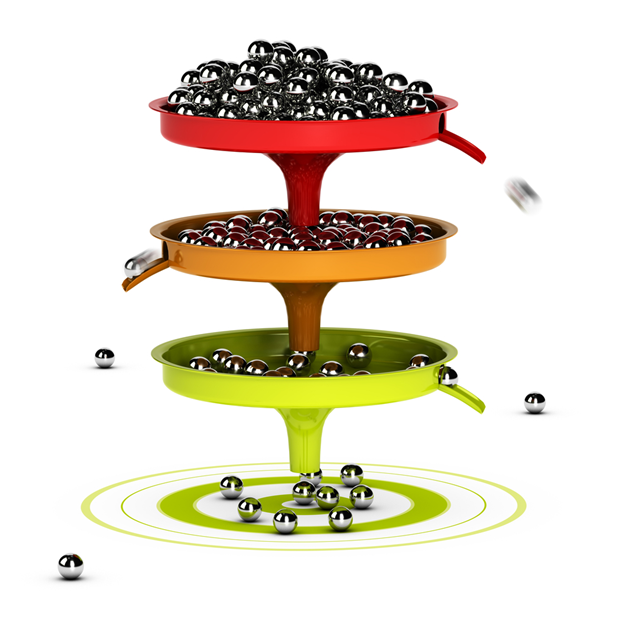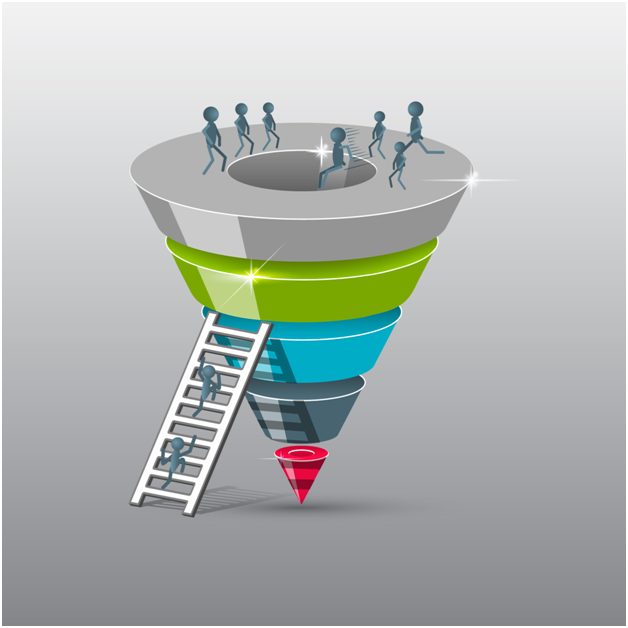A conversion funnel is a concept that illustrates a customer’s journey from discovery to action, and establishing an effective funnel is critical to achieving success online. In the real world, all of the liquid poured into the top of a physical funnel will make it out through the bottom. This is not the case in online marketing — every conversion funnel has leaks. The most effective conversion marketing funnels plug as many leaks as possible while retaining the highest number of customers throughout the journey.
- Identify the Four Sections of Conversion Funnels
There are four stages in every conversion funnel:
- Awareness: Your potential buyers discover your brand or product.
- Interest: Your potential buyers become intrigued about what you make, do or sell.
- Desire: Your potential buyers are convinced that your brand or product is something that could benefit them.
- Action: Your potential buyers are no longer potential buyers — they make a purchase and become customers.

- Understand the Inherent Leakiness of Conversion Funnels
The first stage, awareness, is at the top of the funnel, which is wide, and filled with potential buyers who will never actually take action. In fact, fewer than five percent of the people who enter the top of your funnel will ever make it to the bottom.
This is because most people who become aware of your brand will never take an interest in it. Most who find it interesting will never actually have a desire to purchase it for themselves. Of those who desire it, just a few will ever take action and convert.
- Create Awareness
Pull in large numbers of potential buyers through advertising, optimizing your site for organic search and by creating a strong social-media campaign. Your website is never more important than it is in this stage. If customers take the leap from social to your site or blog, only to find information that is incomplete, inaccurate or just plain dull, they will leave and likely never come back.
- Drum up Interest
Prevent leaks by creating interest among those who are aware of your brand. The single best tool to accomplish this is strong content, but you can also generate a buzz around your brand by holding lotteries, giving away gift certificates or launching hashtag campaigns. These strategies help turn those peripherally aware of you into potential consumers actively engaging with your brand.
- Create Desire
Once people are interested, the best way to get them to desire your product is to identify a problem or pain point they and position yourself as the solution. A good way to do this is through the use of case studies, which showcase real-world examples of how your product or service has helped previous customers.
- Spur Customers to Take Action
Optimize individualized landing pages and with strong layout and design to encourage those remaining in your funnel to follow through and convert. Focus on powerful calls to action and solid landing page fundamentals.

- Analyze Results
Use your analytical application to identify the leakiest parts of the funnel, and to pinpoint the specific stages where the most customers leaving.
- Plug the Leaks
Once you identify the leaks, take action to reduce them. This could include creating more effective calls to action, adding different value propositions for employees or crafting more effective landing pages, which may include adding explainer videos or simply adjusting your color scheme.
A conversion funnel is a model that helps marketers identify how potential buyers become customers, and where they are most likely to be lost along the journey from awareness to action by your employees. Understand the funnel, build one remote employee monitoring software and then monitor it regularly so you can optimize it, improve it and plug the inevitable leaks.